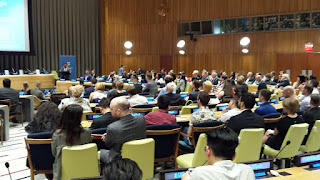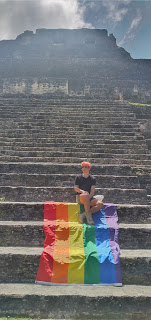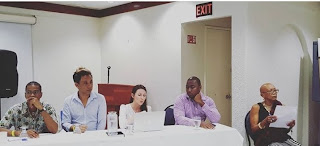Belize Rights Environment
In 2009 the case of Jose Garica highlighted how weak our system is defending young LGBT persons from discrimination even though constitutional rights are said to be in place.http://www.iglhrc.org/cgi-bin/iowa/article/takeaction/globalactionalerts/1032.html.
The political environment seem to seek to render LGBT issues invisible by couching general language into all things policy. The result of this recognition led to The United Belize Advocacy Movement issues a report to the Human Rights Council in 2009. The report can be seen at this link.http://lib.ohchr.org/HRBodies/UPR/Documents/Session5/BZ/UNIBAM_SRI _BLZ_ UPR_ S5_ 2009 _UnitedBelizeAdvocacyMovement_theSexualRightsInitiative_JOINT.pdf The result of this effort led government for the first time in a formal forum to state its position on LGBT issues. The following link records government response to our report at http://lib.ohchr.org /HRBodies/UPR/Documents/Session5/BZ/A_HRC_12_4_Add1_BLZ_E.pdf Government response was established in recommendation 9, 12, and 28. Additional points to establish a mechanism was in recommendation 10 and 13. As the Executive President, we note with alarm from recommendation 28 the following:
While there is no political mandate at this time to amend the relevant legislation, the
Government is nonetheless committed to protecting all members of society from discrimination.
Indeed protection from discrimination is protected by the Belize Constitution.
For us as a human rights organization, we believe that human rights of a marginalize population does not need a political mandate, for its, the state responsibility to enforce the human rights of all its citizens with value. This kind of double speak politically, helps to frame that rights of its citizens are more equal than others. More importantly it ignores the preamble to our constitution. The preamble reads as follows:
"Affirm that the Nation of Belize shall be founded upon …... faith in human rights and fundamental freedoms, the position of the …... the dignity of the human person and the equal and inalienable rights with which all members of the human family are endowed by their creator."
Note, the preamble to the constitution at no point says except homosexuals, transgender, or lesbians. In practice, however, socio-cultural isolation is the norm and basic rights are eroded through self-censorship, the church state-educational system and family without regard for rights.
In an undated letter sent in 2007, sent by The United Belize Advocacy Movement , seeking the party position with reference to an inquiry into The Political Reform Commission Report of 2000 with particular reference to section 5.6 of the report which stated:
" The Commission received several suggestions to add "sexual orientation" to section 3. The main argument was that sexual orientation has been a basis for discrimination in Belize and that including section 3 would enhance the protection of fundamental rights and freedoms of person of Belize. Notwithstanding some reservations, the majority of the Commission agreed that it should be included...."
The United Belize Advocacy Movement received a letter dated, 15th, February, 2007 the then PM responded in the following way:
"As party and as government we remain committed to t he fundamental principle and practice of non-discrimination. This is especially relevant in the implementation of the national HIV policy to ensure that no person irrespective of one's sexual orientation should experience stigma. Amending the constitution, as was suggested, will not in our view address what is a socio-cultural matter. "
A similar letter was sent to the UDP office, but with no response.It wasn't till 2009 in the Universal Periodic review process that government finally had a formal position.
Navigating, the environment of health can be said to be a little bit more easier for institutional dialogue around discrimination and rights concern is ongoing. In a press release, dated April 18th, 2007, the National AIDS Commission responded to a vile article called "The Medical and Economic Consequence of What Homosexuals Do." The National AIDS Commission did take a stand in which it issued a release stating the following:
“......We must also respond to dispel the perpetuation of the myth that HIV/AIDS is a gay disease that “starts with gays and ends with gays” The distinct impression that Mr. Okeke gives is that HIV started with gays in New York and spread to the rest of the world. Whereas there is no definitive answer to the origin of HIV, it certainly did not originate in homosexual s in The United States of America ….
The NAC must therefore stand firmly on the side of reducing stigma and discrimination against all persons living with HIV and all vulnerable groups as we continue to struggle against the epidemic. Mr. Okeke article will only fuel debilitating fear, stigma and discrimination that all our partners have been trying so hard to reduce . His statement must therefore be expose d as being directly contrary to the National HIV/AIDS Policy and therefore the Commission, squarely condemns them .”
The interesting thing about this release was that it only could printed in the Belize times and Reporter because of certain positions taken by parts of the media. The Belize Red Cross issued its own statement supporting the National AIDS Commission rebuttal statement.Further in its release it stated the following:
"The Red Cross promotes the ideals of tolerance, and non-discrimination among all people of the world. We strive to alleviate human suffering wherever it is found.. Mr. Okeke article serves to further demonstrate the infinite importance of the work of the NACNGO's...."
This was important as only BFLA since then have declared that sexual rights are human rights on LIK ROAD.
We must say that from 2007 to January 31, 2011 is a long time. The date mentioned highlights further discussion around human rights. In a release issued to Commissioners, Political Parties, Council of Churches, Media houses and the Attorney General Office the National AIDS Commission once again issued an open letter after Ugandian activists David Kato was bludgeoned to death with a hammer. The release stated:
The recent murder of David Kato, a human rights activist in Uganda who spoke out on behalf of the rights of sexual minorities, has served as a forceful reminder of the consequences of stigma and discrimination.....We therefore call on government to continue its work against stigma and discrimination by changing policies to prevent discrimination based on sexuality by members of the uniformed services. ...In addition, we call on leaders, owners and managers of all organizations, including religious groups and media outlets, to institute their own firm policies against stigma and discrimination, with penalties for those who violate these policies..."
Building on all these efforts to increase sexual minority issues we have been working with our partners in CARIFLAGS and at the OAS to advance the human rights of LGBT populations. Through CARIFLAGS we coordinated action to press our foreign Ministry to include sexual orientation into the UN resolution on Extrajudicial Killings after they voted to remove the reference after 10 years. It was a proud moment when we worked with 13 other Caribbean LGBT activist to push reverse positions on the issue. This reversal, builds on resolution 2345, 2504 and 2600 which all condemns acts of violence and other human rights abuses against LGBT individuals in the Americas. It an enlightening experience for Belize as it was getting a taste of political dialogue.
We also participated in the political dialogue dealing with the Summit of the Americas in Washington and the regional meetings in preparation for the final meeting in Port of Spain. We learnt quickly, how, LGBT issues could be rendered invisible in this document in couched language like " vulnerable groups." We discovered quickly that the Civil Society was going to be excluded from any revisions evn though we were invited to contribute our thoughts.
Building on these successes, we held a meeting in Guyana to strengthen the work of LGBT activists in the region, with Belize being one of three country facilitating the meeting as we worked to sensitize activists about the importance of the OAS system. The result lead to the development of a regional report on LGBT Violence in the region that was presented in 2010 to the Inter-American Human Rights Commission in one of their thematic hearings in 2010.
In the next post, will look at documentations of discrimination, and dig deeper into what the community is doing do foster community dialogue.



Comments
Post a Comment